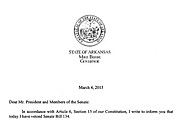LITTLE ROCK — Gov. Mike Beebe vetoed a bill Monday that would ban most abortions beyond 12 weeks of gestation. The Senate is scheduled to vote whether to override the veto today.
Sen. Jason Rapert, R-Bigelow, the sponsor of Senate Bill 134, said Beebe’s veto isn’t a surprise.
“Given the opportunity to save lives of unborn children, this governor has always chosen in this session to say no he told reporters. “I am disappointed for all the unborn children that could been saved in this bill, but I have faith that the 70 percent of the Legislature that voted to pass the bill will be there to override this veto.”
Rapert said he will ask the Senate to override Beebe’s veto today. If the Senate overturns the veto, it alerts the House in a letter. Any time after receiving it, the House can vote whether to override.
The Senate initially voted 26-8 to pass the bill. Rapert’s bill passed the House 68-20. It takes majorities of the 100representatives as well as the 35 senators to override a veto.
Rapert said he has asked the governor to respect legislators who voted for the bill.
“He had a choice to allow it become law without his signature. He chose this route. That’s his choice, not mine,” Rapert said.
Of the 4,033 abortions that occurred in Arkansas in 2011, 815 occurred at or after 12 weeks, according to the state Department of Health. That means that if Rapert’s bill were already in place, it would have affected about20 percent of abortions in Arkansas in 2011.
In a meeting with the governor Monday morning, Rapert said he told Beebe, “Governor, I have given you an opportunity to save thousands of lives in the future of this state ... and you have stated that you would sign a bill to do away with the death penalty in the state of Arkansas for convicted murderers. I believe the same place in your heart in which you would find yourself able to do that should be the same place in your heart that you should be able to protect the lives of unborn innocent children,” Rapert said.
Beebe said he met with Rapert six or seven times to discuss the bill, including Monday morning, which he said was cordial.
“He’s very passionate about what he believes in and he’s asked me not to veto it. He’s made his arguments,” Beebe said. “I’ve got to do what I’ve got to do. I swore to uphold the Constitution and that’s what I’m doing. It’s unconstitutional. Under current law, it’s unconstitutional.”
In his veto message, Beebe mentioned the potential cost to the state from litigation if the bill became law.
But, Rapert said, “It’s a very weak reason not to protect the lives of unborn children.”
Sen. Joyce Elliott, D-Little Rock, disagreed.
“After all, right now we are struggling to have enough money to pay for everything we need to pay for. I think just the notion of spending money to defend a bill that seems patently unconstitutional is not just a good use of our funds,” she said.
Bettina Brownstein, an attorney representing the Arkansas chapter of the American Civil Liberties Union, said the group will file a suit in federal court if Rapert’s bill becomes law.
“I have to hold out just a little hope there is still respect for [U.S.] Supreme Court opinions as the law of the land in the Arkansas Legislature,” she said. “It’s so blatantly unconstitutional. It’s just a no-brainer.”
She said she is cautiously optimistic the veto won’t be overturned.
Senate Bill 134 is the second abortion-restricting bill Beebe has vetoed this legislative session.
Lawmakers overturned Beebe’s veto of House Bill 1037 by Rep. Andy Mayberry, R-Hensley, late last week (it’s now Act 171) and legislators from both parties said they expect that to happen again.
House sponsor of the bill, Rep. Ann Clemmer, R-Benton, said she hasn’t started counting votes.
“There are quite a few abortions that take place after 12 weeks and I think this Legislature is ready to make the stand to say we want to see that practice curtailed,” Clemmer said. “We’ll just see what transpires with the override. The votes might not be there, but I would think they would be.”
House Democratic Leader Greg Leding of Fayetteville said he doesn’t expect the veto to stand.
“I don’t expect a different outcome,” Leding said. “I expect more votes to override his veto this time than the first veto. I think a lot of people who voted to sustain the veto or who did not vote at all the first time have felt some pressure back home, and might not be as likely to sustain the governor’s veto.”
Still, he said, members seem to have more problems with the 12-week ban than they did with the 20-week ban.
“I think there are a lot of them that do believe that this one is absolutely unconstitutional where there was still some discussion and debate among the members whether or not Rep. Mayberry’s was unconstitutional. I think everyone does agree that this one is far more restrictive,”Leding said.
Beebe cited the same U.S. Supreme Court cases in his letter to legislative leaders about Rapert’s bill as he did about Mayberry’s bill.
The Court’s 1973 Roe v. Wade decision found that states cannot ban abortion before the fetus is viable. Arkansas code defines viability as 25 weeks into the pregnancy and bans most abortions at that point.
Rapert defines viability in his bill as when the fetus has a detectable heartbeat.
Beebe quoted the court’s 1992 Planned Parenthood v. Casey decision, which showed “a recognition of the right of the woman to choose to have an abortion before viability and to obtain it without undue interference from the state.”
He wrote in the letter that 12 weeks is too far from the point of viability to be constitutional.
Senate Bill 134:
Bans abortion more than 12 weeks after conception if a heartbeat can be detected.
Counts pregnancy from conception, which is defined in state law as calculated from the first day of the pregnant woman’s previous menstrual cycle.
Exempts pregnancy resulting from rape or incest.
Exempts abortions done to save the life of the mother or when the pregnancy will cause irreversible and catastrophic harm to a major bodily function of the mother.
Allows abortions in the case of insurmountable health problems when the fetus may not live long outside the womb.
Requires the State Medical Board to revoke the medical license of doctors who perform illegal abortions.
Initially Rapert’s bill banned abortion as soon as a fetal heartbeat could be detected. He amended the bill over concerns that a woman seeking an abortion would have to undergo a transvaginal ultrasound, where a wandlike probe would be inserted into the vagina to detect a heartbeat as early as six weeks of gestation.
The bill, in its present form, calls for women to undergo abdominal ultrasound test, the most common type of ultrasound.
Front Section, Pages 1 on 03/05/2013


